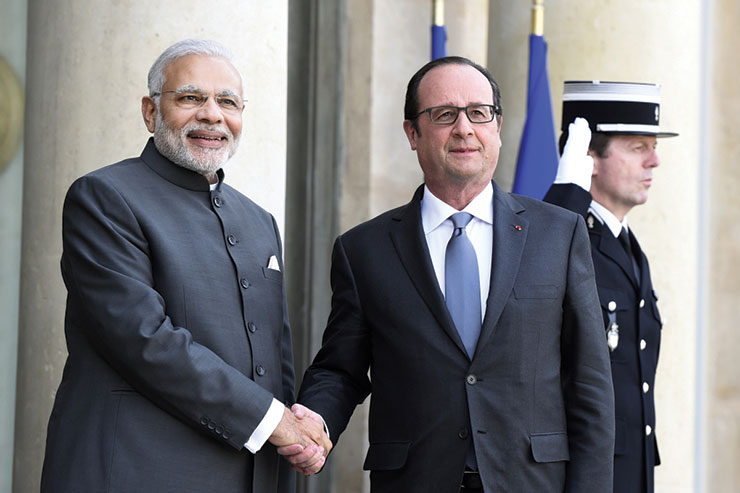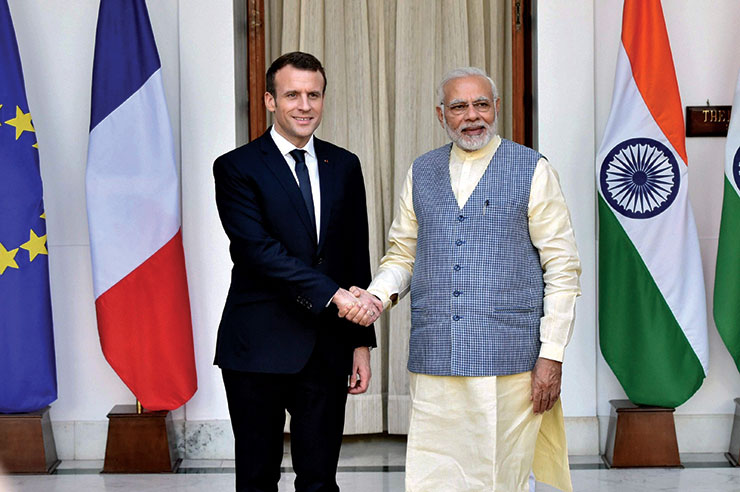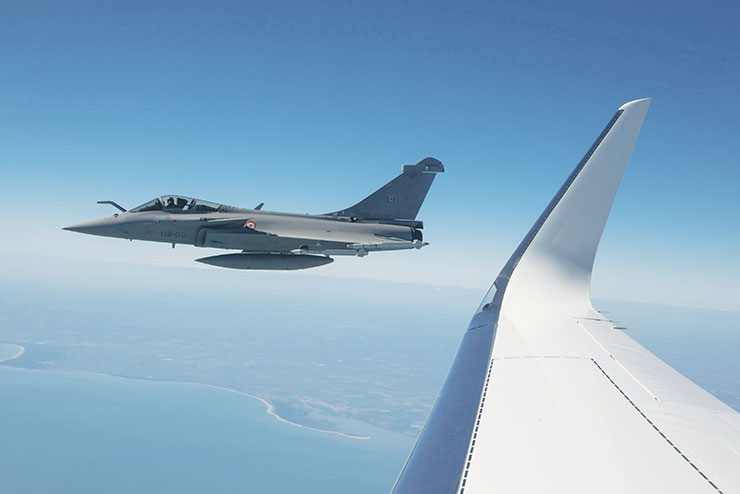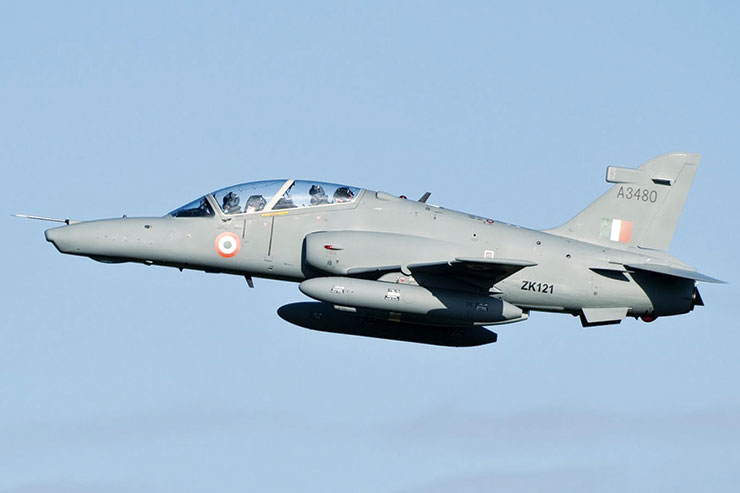INDIA-EUROPEAN UNION (EU) strategic partnership is based on shared principles and values of democracy, freedom, rule of law and respect for human rights and territorial integrity of States. There was progress made in implementing the EU-India Agenda for Action-2020. The Agenda envisions a common roadmap for strategic partnership on the core concerns of foreign policy and security cooperation, trade and investment, business and economy, global issues, sector policy cooperation.
India and EU launched new initiatives in smart and sustainable urbanization, clean energy and climate change. However, analysts are of the view that this strategic partnership has been high on rhetoric and low on substance.
At the outset, India does not have defence relations with European Union as a whole. India has had stronger defence relations with individual European countries. According to Stockholm International Peace Research Institute (SIPRI) Report (2017), the combined arms sales of companies in Western Europe listed in the SIPRI Top 100 in 2016 was at a total of $91.6 billion—an increase of 0.2 per cent compared with 2015.
Although India’s defence trade with Europe may appear fragmented, it is consonant with her foreign policy priorities and the need to diversify its military supplies. The strengthening, consolidation and integration of European Defence and Technological Industrial Base (EDITB) can be a driver and an opportunity to boost EU-India security and defence cooperation.

India has had strong bilateral relations with the member states of EU in areas of defence procurement and production. EU countries have significant defence related technological expertise, infrastructure, and vast combat and peacekeeping experience. It is herein worthwhile to briefly review India’s defence relations with United Kingdom (UK), France, Germany and Italy. Apart from also focusing on major Western European nations, India is gearing to reinvigorate its strategic, defence ties with the countries of Eastern Europe.
India-UK defence cooperation is built on the framework of the Defence and International Security Partnership (DISP), agreed in November 2015. According to SIPRI Report (2017), the UK’s decision to withdraw from the European Union did not seem to have an impact on the arms sales of British companies. India has had many products of British origin in service such as aircraft carrier INS Viraat, Harrier aircraft and Sea King helicopters.
India and UK have recognised the potential for further cooperation in defence manufacturing between the British and Indian companies under ‘Make in India’. This is reflected in the Memorandum of Understanding (MoU) between Bharat Dynamics and Thales UK on technology transfer opportunities for missile systems. India and UK seek to develop an Advanced Hawk jet trainer jointly by the BAE Systems and Hindustan Aeronautics Limited (HAL). There is a renewed focus between the two countries for greater military engagements, naval interactions including enhanced Maritime Domain Awareness (MDA) to exchange information to track terrorists and pirate vessels.

Adding to the growing depth in India-France defence relations, both sides agreed on a strategic pact providing for the use of each other’s military facilities including opening naval bases to warships. There were detailed discussions recently on the procurement of another batch of 36 Rafale jets in fly away conditions from France. The French President, Emmanuel Macron, personally considers Rafale jet deal as the heart of the Indo- French strategic partnership. This deal has the potential of pumping in over $2.3 billion into the Indian defence manufacturing sector, a major chunk of which will go to the private industry. The strategic trust between India and France is evident from both sides signing a pact on the exchange and reciprocal protection of classified information.
India also looks forward for the construction of six Scorpene submarines in India, in collaboration with French shipbuilder, Naval Group. Mazagon Dock Shipbuilders Ltd had earlier signed a technology transfer agreement with the Naval Group for building six Scorpene submarines, the first of which was delivered recently. India and France acknowledged that the ‘Make in India’ initiative provides a valuable opportunity for Indian and French defence enterprises to enter into co-development and co-production projects in the defence sector, including through transfer of technologies (ToTs).
India stands to gain by bolstering its defence cooperation with Germany. Germany is the fifth largest exporter of arms to India. Over the years, India’s military acquisitions from Germany were four Type 209 submarines, diesel engines for submarines and tanks, Do-228 aircrafts. India needs to tap into the potentialities of highly sophisticated German technology and their cutting edge weapon systems. For this purpose, India-Germany Defence Cooperation Agreement (2006) provides a framework for bilateral defence cooperation.

The Annual High Defence Committee meetings at the Defence Secretary level takes place alternately in New Delhi and Berlin. In the upcoming visit of Chancellor Angela Merkel, there have been reports indicating India and Germany may announce the joint production of defence platform as part of ‘Make in India’ initiative. This is indeed an opportunity to expand the strategic component in their inter-governmental consultations (IGC).
India and Italy have strengthened their defence ties with greater dialogue and interaction between defence firms. This step comes in the backdrop of investigations in India over alleged kickbacks being paid by Italian company Finmeccanica’s subsidiary AgustaWestland to swing a contract for helicopters in its favour. Both sides established a Joint Defence Committee to enhance and encourage a structured dialogue between Indian and Italian defence firms. Reportedly, the main idea behind establishing the committee was to lend greater clarity in government defence procurement policies. Both sides agreed to discuss, in the appropriate working group, the draft Technical Agreement on Sharing of White Shipping Information between the Navies.

India also needs to reach out to Central and Eastern Europe (CEE). India is reliable on Ukraine for repair and modernisation of Soviet weapons. According to reports, Ukraine was looking at partnering with Indian firms to pursue opportunities in areas such as armored vehicles, transport aircraft, radars, electronic warfare equipment and unmanned aerial vehicles (UAVs). In the naval sphere, India is also in talks with Ukraine for gas turbines for a frigate programme. Likewise, V-4 provides India an appropriate platform to engage strategically with Eastern and Central Europe. India’s benign approach linking the Eastern and Central Europe with Eurasia presents enormous opportunities of growth.
India could emerge as pivot for Eastern-Central Europe-Eurasia and Indo-Pacific region. However, according to a Gateway House Report (2016), though Indian military personnel have found West European equipment to be technologically outstanding and reliable, it is not so in the case of the military spare parts coming in from Central and Eastern Europe.
The role of EU as a global security provider was reaffirmed by its commitment to enhance maritime security cooperation in the Indian Ocean and beyond. There were recent joint manoeuvres (PASSEX) between the EU Naval Force and the Indian Navy off the coast of Somalia thus showing a successful example of naval cooperation. In a Joint Statement on Cooperation in Combatting Terrorism (October, 2017), India and EU expressed a joint commitment to explore opportunities to develop cooperation between the relevant institutions on both sides, to, inter alia, share information, best practices, including on countering the on-line threat of radicalization, and to engage in capacity building activities, such as training and workshops. Combatting piracy, terrorism, radicalisation therefore is the new strategic avenues for India and EU to cooperate and coordinate in future.

The India-EU defence partnership has not realized its true potential. There is urgency for both sides to work on their common interest areas, forge collaborations, and expand the existing cooperation for mutual benefit. ‘Make in India’ initiative is an opportunity for European countries to make investments given that the government has made it easier for foreign investors to venture into the defence manufacturing sector. However, it may also be flagged that this initiative failed to attract Foreign Direct Investment (FDI) in this sector with a paltry amount of Rs 56 lakh coming in since 2017 when norms were first eased by the government. The potentialities of India and Europe defence and strategic relations lie in tapping the European Defence market effectively. It is also necessary for India to engage with the key market players in a transparent fashion with the clear intention of obtaining value added technologies so as to develop her sound indigenous defence eco-system.
– The author is a researcher at Internal Security Centre, IDSA. Views expressed are of the author and do not necessarily reflect the views of the IDSA or of the Government of India.
–The writer is Assistant Professor, ICFAI School of Liberal Arts, ICFAI University, Jaipur. The views expressed are of the writer and do not necessarily reflect the views of Raksha Anirveda






